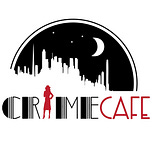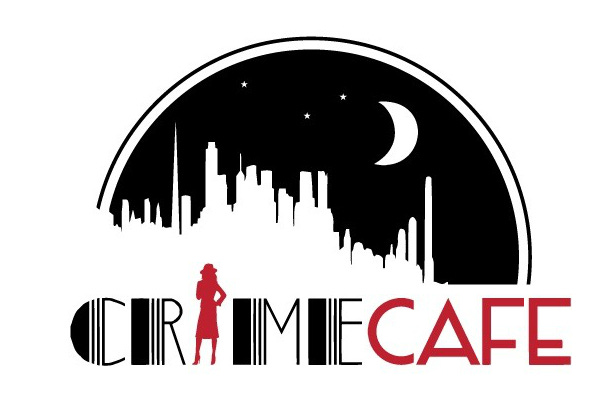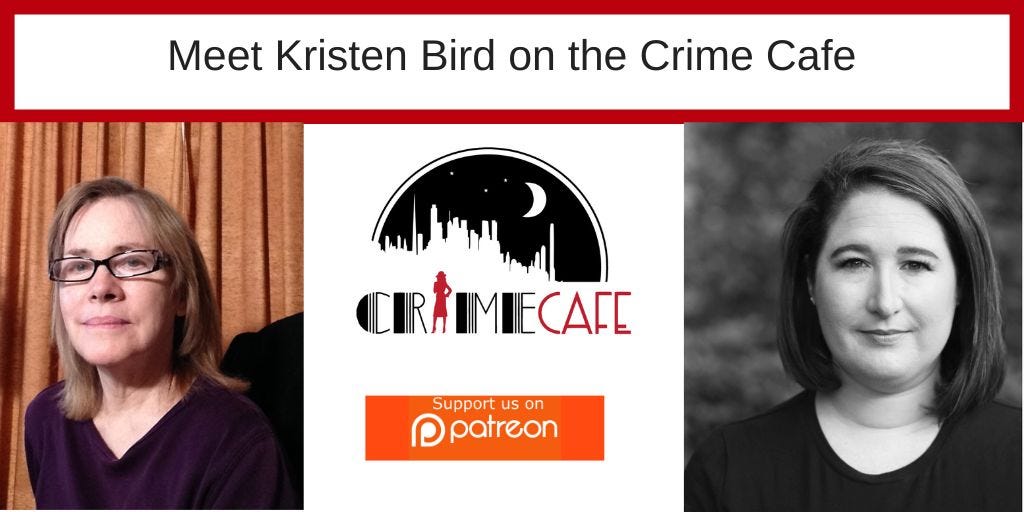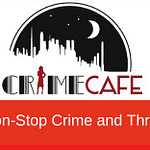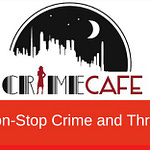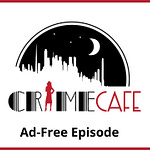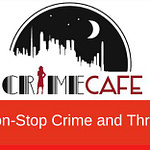This episode of the Crime Cafe features my interview with crime writer Kristen Bird.
Check out our discussion of her latest novel Watch it Burn, along with the book she’s giving away I Love it When You Lie.
Remember to leave a comment on my blog to enter the giveaway! 🙂
Download a copy of the transcript here.
Debbi: Hi, everyone. My guest today earned a Bachelor's degree in Music and Mass Media before getting a Masters in Literature. Along with being an author, she teaches high school English (yay!), and writes with a cup of coffee in hand. Do you do that one-handed?
Kristen: Write?
Debbi: Well, I'll tell you, I do love my coffee.
Kristen: Yes, me too.
Debbi: Oh yeah. Oh boy. I can't live without. In her free time, she likes to visit parks with her three daughters and watch quirky films with her husband. Oh boy. We have things to talk about because I love quirky films. Her most recent novel and the one she's giving away is I Love It When You Lie. I even have a copy here on my Kobo. You can see the cover maybe if you're watching, and her next release will be her third novel, Watch It Burn. I've read her excerpt and it's really something. From Houston, Texas, I'm pleased to have with me Kristen Bird. Hi, Kristen. How you doing today?
Kristen: Good. Thank you so much for having me today.
Debbi: It's a pleasure to have you. Yeah, believe me. I read your excerpt and wow!
Kristen: Oh, thank you.
Debbi: Oh, you're welcome. Readers learn so much about your protagonist in that first chapter. This is after a prologue that's already intriguing, and then a little excerpt from like a newspaper or something.
Kristen: Right.
Debbi: You know, that first chapter and then you end it with a nice hook.
Kristen: Oh, thanks.
Debbi: I will not say what. What's interesting is that you're weaving in the character's backstory without it reading like exposition. What's your technique for doing that?
Kristen: I think my technique is lots of failure at not doing that, and so some of the earliest comments from my agent who liked the story of the first book that I sent her also said, you're doing way too much telling. Can you please make this more vivid for us? Can you please show it to us? And so with the second book, before I even sent it to her for editing notes, I really tried to ask myself with every chapter, how can I paint a picture of this, rather than just tell everyone what's happening? So I think that maybe just having that question in the back of my mind was really important. I also like to focus on settings that are really vibrant and familiar to me, and so I think that that helps as well.
I really tried to ask myself with every chapter, how can I paint a picture of this, rather than just tell everyone what's happening? So I think that maybe just having that question in the back of my mind was really important.
Debbi: Yes, absolutely. Those little details that add up to a whole picture of a world, right?
Kristen: That's right. Yep.
Debbi: You're just creating that experience with words. Now let's see, what else? How would you describe your books in terms of genre?
Kristen: I think that they are southern suspense, most likely. They always have a mystery at the heart of them. They're set in a small southern town, but I have had people say to me that sometimes it feels a little more like women's fiction and less like the thriller genre, which is kind of the catchall for a lot of these different subgenres. So right now, I think I would say southern suspense.
I think that they are southern suspense, most likely. They always have a mystery at the heart of them.
Debbi: That's really cool. Southern suspense.
Kristen: Yeah.
Debbi: As opposed to, say romantic suspense.
Kristen: Right. Most of my characters are involved in some kind of relationship, but there's definitely not the ... it's usually not the kind that's like, let's have a happy ending necessarily . So I don't know how romantic it always is.
Debbi: Well, I can appreciate that for sure. Definitely. What inspires you to write the stories you do?
Kristen: I mentioned the setting earlier, and I think that that actually is the first thing that comes to mind before I write. My first book was set in Galveston, which is where my husband and I lived for about three years early in our marriage when we were both still in our twenties. My second book is set in North Alabama, which is where my extended family is from. And so even though I only lived there for a few years as a child, that's where we would always travel back to for holidays. And then this third one is set in the Texas Hill Country, which is about three hours from where I live, but it's kind of one of those quick getaway vacation spots for us. So it often for me has that kind of feeling of escape in a way, and so I think that the setting is really mostly what it inspires or comes to mind first.
Debbi: Interesting. Are your books standalones or are they related in some way?
Kristen: They're all standalones. The only related element is that small town mystery in the South.
Debbi: Well, that's very interesting. So tell us about your latest book and tell us about the one before that.
Kristen: Okay.
Debbi: And if you like, tell us about the first one.
Kristen: Okay. Sounds good. So Watch It Burn is set in the Texas Hill Country and it opens with a town that is on fire. Then we backtrack about a week to lead up to how this happened. And as we backtrack, we find out that a week ago, a 65-year-old woman was found drowned in only two inches of the Guadalupe River, and many of the women in the town found this suspicious for a variety of reasons, one of which is that she was the wife of a businessman who has basically running an empire out of their town that has suspicious, cult-like undertones to it. So as they start investigating the death of this woman, his wife, they also are deciding what they need to do in order to save their town from this man and his cultish organization.
So Watch It Burn is set in the Texas Hill Country and it opens with a town that is on fire. Then we backtrack about a week to lead up to how this happened.
Debbi: Very interesting. Yeah. It's interesting that you're exploring the dark side of small town living, because I'm actually doing that myself in something I'm writing.
Kristen: Oh, really? Can you tell me about it? Not yet?
Debbi: Well, not ... really. Not yet. Because actually it's the idea for a screenplay.
Kristen: Oh, very cool.
Debbi: And I could actually turn it into a book. That would be interesting, but we're getting a little off of you. I want to talk about you.
Kristen: So I can tell you about I Love It When You Lie too, if you want.
Debbi: Yes, please do. Yes.
Kristen: That one is set, like I said, in North Alabama. It's in the Appalachian foothills where I grew up, and it is about three sisters and their beloved grandmother. Their grandmother was supposed to be celebrating her 80th birthday, but instead she passes away, and so they all come back to her house for her funeral on Decoration Day, which is a tradition that is specific to the area of the country where I grew up. It's every Sunday in May where people go and they decorate the graves of their loved ones. So they're back on Decoration Day for their grandmother's funeral. Each of them brings with them a problematic man, and before the weekend is up, one of those men will be in the grave with their grandmother.
Each of them brings with them a problematic man, and before the weekend is up, one of those men will be in the grave with their grandmother.
Debbi: Hmm. Fascinating. I am hooked already. That's great. So where are you in the process of bringing out Watch It Burn?
Kristen: It comes out next March, March 12th, so I just have proof pages left to do, most likely in November. And then just talking to people about it and hoping that people will give it a try.
Debbi: I hope they do too, because really fascinating stuff here. What authors have most inspired your writing?
Kristen: Lisa Jewell is a huge one for me. I got to actually interview her at our local bookstore, Murder By The Book, in Houston. I found out then that she was not only a great writer, but also just a lovely human being, which is always a nice surprise when you meet people you admire and they're just very kind. So, Lisa Jewell definitely. I also have some Texas authors that I really admire – May Cobb, Ashley Winstead. And then actually, maybe just being an English teacher, I read across a lot of genres, so I just will be teaching Brit Bennett's The Vanishing Half, which is a historical upmarket kind of book that I really like.
So I feel like I can take elements of anything I read and things I admire and aspire to them, even if it's not the exact same genre that I'm writing in. Maybe they have beautiful prose or maybe they have really descriptive imagery of the setting or the characters. And so I feel like I'm just trying to steal little nuggets from all of these great writers that I get to either read or teach.
I feel like I can take elements of anything I read and things I admire and aspire to them, even if it's not the exact same genre that I'm writing in.
Debbi: You're stealing like an artist. That's right. Austin Kleon, I think put it...
Kristen: Oh, interesting.
Debbi: Somebody, yeah. He wrote a book called Steal Like an Artist. I've always liked it.
Kristen: I've heard it said that writers are like vampires. We suck the stories out of people. So same idea, maybe.
Debbi: Yeah, yeah, exactly. Writers are like vampires. A lot of us work at night.
Kristen: Yeah, that's true.
Debbi: A lot of us, et cetera. Oh, my. How much time do you spend on research? Do you research a lot when you write a book?
Kristen: I tend to research as I go, so I'm not sure that I could put an exact number on it, but probably early on I spend, I don't know, 10 hours or so just kind of on and off trying to get a feel for the place or for the occupations that I'm having the people do or for traditions in the community. Usually, that kind of wanes as the story goes because I've learned what I needed to learn. My very first book, The Night She Went Missing, took the most research because the victim was an 18-year-old girl who was a science nerd. I teach English, so I had to go in and try to understand scientific concepts that I haven't thought about since I was about 18, so I had to do a little work for that one.
Debbi: Exactly. When you write about another world that you haven't been a part of, you really have to look. I write about a female Marine now. I've never been a Marine. I know some Marines. I don't know any female Marines though, so it's kind of like I'm transferring some of the knowledge. A lot of it comes from books that Marines or other armed forces have written, so it's a lot.
Kristen: And then you have to imagine her in a primarily male setting too, I'm sure.
Debbi: Yeah. Well, she's dealing with a lot of things. Actually, she's out of the military. She's retired at this point, so she's off on disability actually, and she's dealing with opioids and all of that horrible stuff. But be that as it may. Are you a plotter or pantser?
Kristen: I'm a pantser who aspires to be a plotter because it seems like it would make my revising easier. Maybe not the actual writing initially, but I feel like because I'm a pantser writing in a suspense mystery genre where I'm trying to insert clues that I have to do a lot of that on the back end. And then I have to make sure everything lines up and everything's solved. I feel like if I could plot it out, then that part would be easier, but I may be deceiving myself, I don't know. Maybe it's never easy.
I'm a pantser who aspires to be a plotter because it seems like it would make my revising easier.
Debbi: Well, I suspect that a certain amount of plotting can help you write it faster.
Kristen: Yeah. Yeah. That's true.
Debbi: That's my theory anyway, because I'm actually a plotter who learned to be more of a pantser.
Kristen: Oh, interesting. Maybe we just need the mix.
Debbi: I think having a mix is really good. You know, when you get that sweet spot in between plotting and pantsing, where you can surprise yourself a little bit and go, Oh, I hadn't thought about that before. Okay. Maybe I can go this way.
Kristen: Yeah, that's good.
Debbi: What would you say is the best and the worst thing about being a writer?
Kristen: The best thing for me is that writing has become kind of therapeutic for me. I have anxiety as many in this business do, and I think for me, writing is very much an escape. I remember before I even got my agent, telling my husband at one point, I'm gonna keep writing whether or not I get an agent, whether or not I get published, because I can tell it's really good for me and for how I manage my mental health. So that was really important.
The best thing for me is that writing has become kind of therapeutic for me.
I think the worst part is more of the business side of publishing in that you, at least with traditional publishing, and maybe it feels very similar to indie authors, but with traditional publishing, it feels very much to me at all times like everything's up in the air. You don't know how the book will be received. You don't know how it'll be marketed exactly. You don't know.... there's just so much that you don't know before publication date and even for several months after, until you get that royalty statement and you have some hard figures to look at. So the not knowing I think is something that I've had to come to peace with, to terms with.
Debbi: Yes, absolutely. I hear you loud and clear. Is there anything else you would like to add before we finish up?
Kristen: I think that I would like to tell aspiring writers to carve out time for themselves to write. I have three kids and I'm a teacher like you said, and sometimes I only get once a week to write. So that carving out of the time doesn't have to be like, oh my gosh, I'm so bad if I didn't do it. But it's like, when can I fit it? When can I do this for myself? And trying to stick to that as much as you can and then giving yourself grace. So I think that that's what I would tell aspiring writers, because a lot of times it's just really a matter of getting the words on the page. And in order to do that, you have to carve out the time.
I think that I would like to tell aspiring writers to carve out time for themselves to write.
Debbi: Absolutely. That is so true. I forgot to ask you that one question — what advice would you give to people who would like to write for a living? Just be a career writer.
Kristen: I think that it's either 500 words a day, 1000 words a day, 100 words a day, whatever it is. If you're a daily writer, make that work. But if you're a weekly writer like me, sometimes I only get Saturday mornings, I'll write 3000 words in one sitting. So figure out what works for you. Be patient. Give it time to figure that out — three months, six months. This is definitely a long game. Once you get that contract, still no one is going to be in a hurry. This is the most patience-developing industry ever, so you're in it for the long haul. Just keep going.
So figure out what works for you. Be patient. Give it time to figure that out — three months, six months. This is definitely a long game.
Debbi: That's it. Amen to that. That is so true. Well, this has been wonderful talking to you and all your thoughts are very well expressed and so true.
Kristen: Oh, thank you. It's been a pleasure to talk to you.
Debbi: Thank you. Hang around. Be sure and hang around because we're going to be doing a bonus episode after this where you out there, if you're listening or watching, you can enjoy it if you become a patron on Patreon. It's for some of my patrons.
Kristen: Very cool.
Debbi: I have these bonus episodes and really we have some stuff to talk about, so don't miss out. It should be fun. Our next guests will be David Bushman and Mark T. Givens, who wrote Murder at Teal's Pond, and I have that book here too. This is the story, the true story that inspired Twin Peaks.
Kristen: Oh!
Debbi: So as a dyed-in-the-wool Twin Peaks fan, I'm looking forward to that discussion. Anyway, it's a fascinating story too. So until next time, I'll be seeing you and happy reading. Talk to you later.
*****

